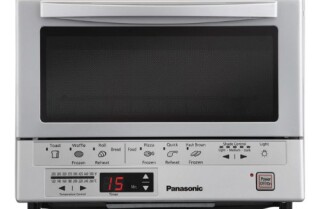Kitchen appliances are a necessity for every household; we simply cannot do without them. But, as helpful and necessary as they are, when left unclean, they can harbor bacteria like salmonella, yeast, and listeria, which can cause stomach upsets or worse. And apart from those, dirty dishes just make your kitchen look appalling.
To avoid that, let’s look at the best ways to clean these kitchen appliances:
Microwave
It’s easy to clean the surface of a microwave, but what happens when there’s an unfortunate splatter? Here’s what you do:
- Get a microwave bowl and feel it with clean water. Put the bowl in the microwave and turn it on.
- Leave the water until it boils.
- Next, turn off the microwave and let the water sit for 10 to 15 minutes. The steam from the water will dissolve every food particle caused by the splatter.
- When that’s done, pour some multi-surface cleaner into warm water, and using a clean cloth, wipe down the interior of the microwave.
Cooktops
The key to keeping your cooktop clean is staying ahead of the mess. Clean up immediately anytime there’s a spill so you don’t give the dirt a chance to cake. When that happens, it gets much harder to clean. However, if you cannot clean up spills immediately, you can get rid of the caked dirt with these steps:
- Pour some multi-surface cleaner into warm water.
- Dip a sponge or cloth into the water and wring it until it’s damp.
- Wipe your stove hard until the caked dirt comes off.
If you are dealing with burnt grease:
- Run a damp rag over the area.
- Pour some baking soda and let sit.
- Scrub with a rag or sponge.
Fridge
On the hierarchy of kitchen appliances, the fridge would rank top three; it’s that important. A lot goes in and out of the fridge on a daily basis, so it’s vital that you give it a deep clean every 2 to 3 months. To clean:
- Empty the fridge of its content.
- Pour some multi-surface cleaner into warm water and wipe the shelves and interior of the fridge.
- Wash the fridge drawers in a sink filled with warm water.
- Get a bowl of clean water and cloth, and wipe down any soap residue from the shelves and fridge interior.
Freezer
The usual method of cleaning your freezer is to turn it off, empty the contents and then clean it. But that may not always be convenient. So, here are steps to clean your freezer without defrosting it:
- Empty the contents of the freezer.
- Boil water and add some multi-surface cleaner into it.
- Dip a cloth into the water and use it to wipe down the interior of the freezer. The ice in the freezer will melt.
- Next, dump the water. Using warm clean water this time and a sponge, wipe down the freezer (interior and exterior). Don’t forget to wash the drawer and shelves.
- Next, dry your freezer. Doing this will get rid of any moisture and prevent further ice build-up.
- Wait for the freezer to get cold again.
- Put back your content.
It’s always best to defrost your freezer before cleaning it. But, if you don’t have the time, you can use these steps.
Range Hoods
Cleaning your range hood can be exhausting, especially after a holiday full of delicious cooking. But these steps will make it as painless as possible:
- The first thing to do is remove your filter.
- Next, boil a pot of hot water. Choose a pot or pan that’s big enough to fit the filter.
- Add some baking powder into the boiling water. Then add the baking soda one teaspoon at a time.
- Dip your filter into the water and leave for 10 to 12 minutes.
- Take the filter out and scrub it with a brush.
Refer to the above section to clean the cooktop.
Wall Ovens
Many modern ovens come with self-cleaning features, but they have drawbacks. When self-cleaning, your oven will generate enough heat to make your kitchen uncomfortably hot. It will also emanate an unpleasant odor. Furthermore, they mostly work well if your oven is moderately dirty. If you’d like to avoid that and give your oven a deep clean, you can do it using lemons:
- Heat your oven to 250 degrees.
- Fill a bowl with water, divide a lemon into two and drop them in.
- Place the bowl in the oven and leave for an hour.
- Open the oven and let it cool.
- Next, wear a glove, take a damp cloth and wipe down the oven.











